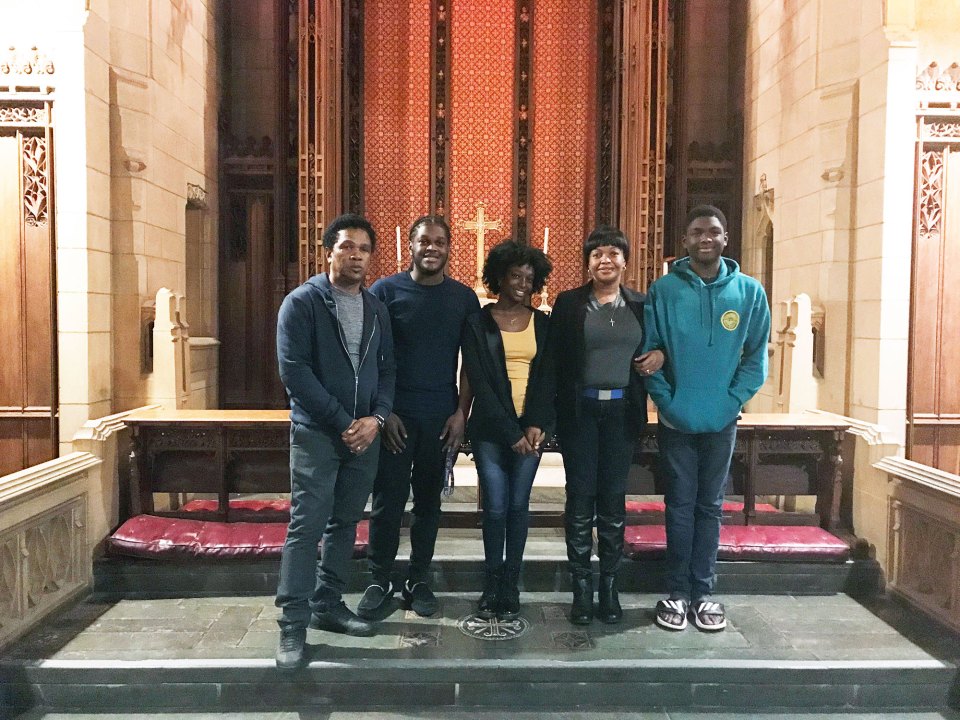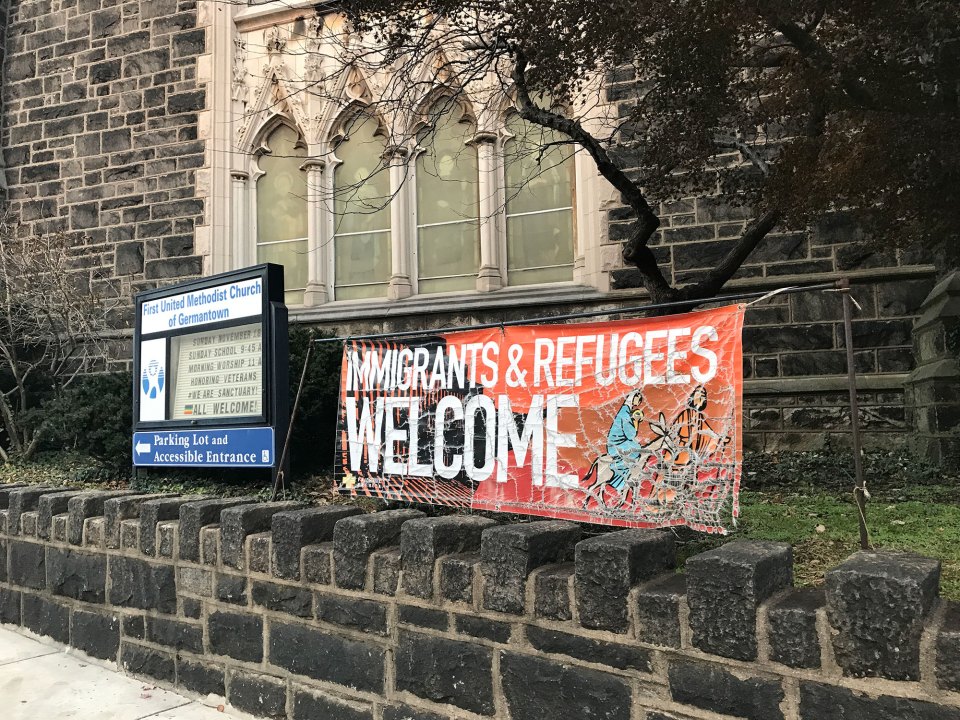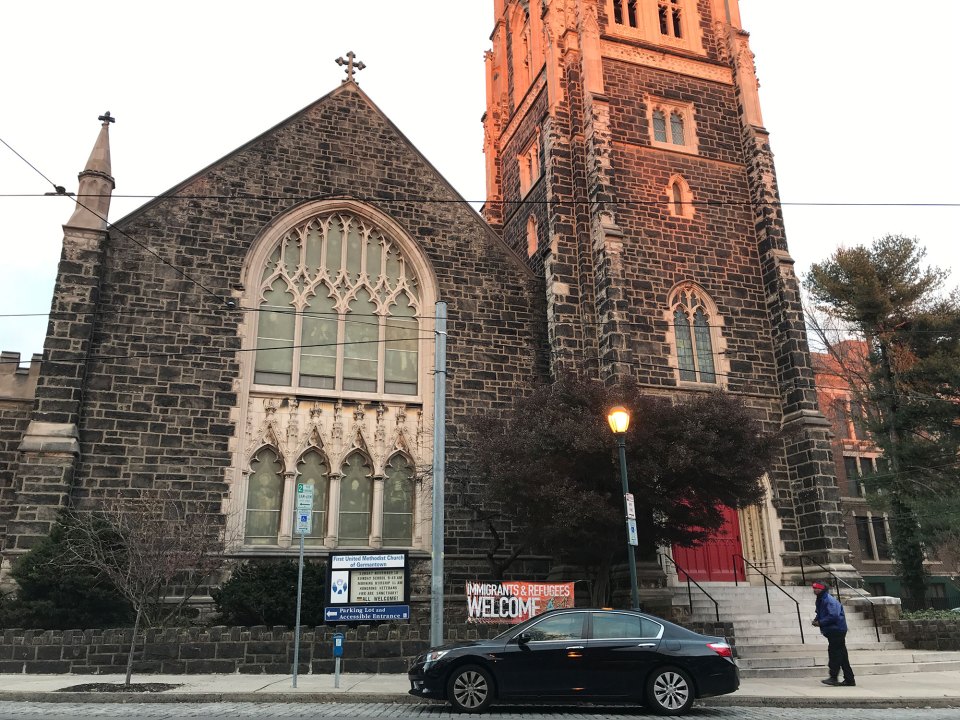
This story is part of a series about how schools, teachers and students are coping with the immigration crisis.

Christine Thompson, 16, recently joined her school’s chess club. She hopes it will be a distraction from the terrifying reality that her family could fall apart.
“I can ease my mind, strategize, think things through,” she said, sitting in a meeting room at the First United Methodist Church of Germantown, a 120-year-old gothic-style church in Philadelphia where her mother, father and younger brother, Timothy, 12, have lived since August.
The family moved into the church seeking sanctuary from deportation after U.S. Immigration and Customs Enforcement (ICE) ordered Christine’s parents, Clive and Oneita Thompson, to return to Jamaica, a country they left in 2004; they say they believed their lives were at risk. Christine switched schools, leaving Bridgeton High School in southern New Jersey to begin her sophomore year at Philadelphia’s International Christian High School. She’s working hard and likes her teachers, but she constantly worries about the fate of her parents — and whether she’ll be separated from them.
“It’s, like, really weird,” she said. “At my age I’m supposed to make friends and have a good high school life. Not being able to do that really hurts.”
Her little brother, normally upbeat and friendly, has had an even harder time adapting to his new home and school. His grades have dropped, and his parents can’t leave the church to visit with his teachers.
The Thompson children are among the thousands whose lives have been upended by the Trump administration’s crackdown on immigration. In some ways, the family is lucky. Thousands of children have been separated from their families this year, including the more than 2,600 who were removed from their parents last spring while crossing the border. As of December 11, over 100 children had yet to be reunited with their families, according to the Department of Health and Human Services, which oversees their care. (A majority of the cases involve a parent — whether in the U.S. or now back in their home country — who has indicated an “intent not to reunify.”)
Another 14,600 unaccompanied minors were in federal custody as of late December, a dramatic increase over previous years, after the government increased scrutiny of adult sponsors, who are often undocumented themselves. (The administration is easing this policy, requiring only sponsors — and not all their household members — to undergo extensive background checks.)
But the administration’s immigration policies and the resulting climate of fear take an emotional — and academic — toll, even on families, like the Thompsons, that have managed to stay intact.
Though Christine and Timothy are U.S. citizens, they’ve opted to stay with their parents, joining them in sanctuary and trading the beds in their suburban home for air mattresses purchased from Walmart and laid out in the church theater’s dressing room.
“There was no separating us,” said Christine.
Related: The unseen obstacles facing undocumented college students
Sanctuary is a civil disobedience movement based on an understanding that ICE will not enter “sensitive locations” — including schools, hospitals and places of religious worship — to arrest immigrants or enforce removal orders. Relatively few immigrants facing deportation resort to public sanctuary. There are currently 52 people in sanctuary in 39 different congregations in the U.S., according to Jennie Belle, a community organizer for Church World Service (CWS), a faith-based organization active in the movement. But as the Trump administration steps up arrests and deportations of undocumented immigrants — including those with no criminal history who were previously considered low priority — sanctuary coalitions are spreading across the country, with more than 1,100 congregations participating.
The Thompsons came to the U.S. from Jamaica in 2004. They said gang members killed Oneita’s brother, burned down the family farm, and threatened their lives. They filed for asylum, received work permits and found jobs — most recently Clive worked as a machine operator at Cumberland Dairy and Oneita as a nurse assistant in a retirement community. They bought their home in Cedarville, New Jersey, in 2007, shortly after Timothy was born.

In 2009 they lost their asylum case. According to their attorney David Bennion, their subsequent appeals were denied for lack of corroborating evidence. Bennion adds this doesn’t mean the persecution didn’t happen — sometimes there just isn’t sufficient public documentation. Due to their U.S. ties and lack of criminal history, ICE granted the Thompsons an administrative stay of removal and placed them under an order of supervision, which allowed them to stay and work as long as they showed up for mandatory periodic check-ins with immigration.
The check-ins were routine — until the last visit at the ICE office in Mount Laurel, New Jersey, on August 24. That time, Oneita said, was “a whole lot different.”
“You’d think I was some kind of criminal. They lock the door, put you in a room, questions and questions,” she said. They asked her why she was here. She said she responded, “What do you mean why am I here? They killed my brother in Jamaica. I came here for asylum.”
The agents gave the couple two weeks to pack their bags and leave the U.S. Oneita said she had believed ICE was “focusing on criminals, not families living by the rules.”
“So I never thought this would happen. [That] you could come work as I did, have a home, send all my children to college by working [and] not getting any financial aid to do it, educate myself some more, work as a nurse assistant, take care of the elderly — because that’s what I love to do,” she said. “And they will still tell you [that] you don’t have a home here or a place in America.”
Related: Eight steps to establish support systems for undocumented students
An ICE spokesman provided the following statement in response to a question about why the Thompsons’ stay of removal wasn’t renewed during the August check-in as the couple had expected:
“Oneita Thompson and Clive Thompson, both Jamaican nationals, overstayed their visas going back to 2004. They were ordered removed by an immigration judge and appealed their case up to the 3rd Circuit Court of Appeals, which dismissed their Petition for Review. Despite numerous stay of removals [sic] granted by ICE to allow them to make arrangements to depart the United States, they failed to depart.
“In an exercise of discretion, ICE has allowed the Thompson’s to remain free from custody while finalizing their departure plans in accordance with the judge’s order.”
The statement adds that ICE’s sensitive locations policy “remains in effect.”
The family scrambled to find help. If they returned to Jamaica, they likely wouldn’t be allowed back in the U.S. for 10 years. Oneita reached out to the New Sanctuary Movement of Philadelphia, which coordinated their move into the First United Methodist Church of Germantown, a congregation with a long history of activism.
“I just wanted to know I’m somewhere the rain is not falling on me and I’m away from ICE,” she said.
The couple moved in on August 28 and carefully selected new schools for the children.

“School means everything to this family. They love to go to school. They’re sick — they go to school. They’re better — they go to school,” said Oneita, who was taking courses at Cumberland Community College to become a registered nurse before moving into the church. “They know how important education is.”
Blanca Pacheco, co-director of the New Sanctuary Movement of Philadelphia, has been assisting both the Thompson family and the Reyes, a family from Honduras that is also living in the church. She said the hardest part for kids in sanctuary is being uprooted from their schools and neighborhoods.
“Logistics-wise it’s impossible to support sending the children every day to their [original] school,” said Pacheco. While Christine takes a public bus to and from her Philadelphia school, Timothy is escorted back and forth by a rotation of volunteers from the New Sanctuary Movement and the First United congregation.
The New Sanctuary Movement met with administrators at the new schools before Christine and Timothy began taking classes to explain the family’s situation and why, among other restrictions, Clive and Oneita would be unable to attend parent-teacher conferences.
Christine and Timothy are among 10 children — eight school-age kids, a preschooler and a baby — currently living in public sanctuary in Philadelphia, according to the New Sanctuary Movement.
“I think the trauma is the daily uncertainty, the hourly uncertainty — [wondering] how will this situation ever resolve?” said Hillary Linardopoulos, staff and legislative representative at the Philadelphia Federation of Teachers, a union representing teachers and other school employees in the city. “For children to see parents struggling and wondering what’s next is hard as well.”
Related: Undocumented high schoolers work long hours, putting college further out of reach
Linardopoulos said protecting immigrant students and those with immigrant parents is “a crucial issue” for educators everywhere. “It’s a human rights issue and if we’re not able to support our families in whatever capacity they need to be supported, we can’t do our job teaching math and reading,” she added.
2,600 — Approximate number of children who were removed from their parents last spring while crossing the border; over 100 have still not been reunited with their families.
The union organized a workshop this past March on how to better serve immigrant students, The program focused particularly on those who are undocumented and, Linardopoulos said, “need that extra level of security and support at the school level.”
“We have to be able to not only just tell them we value and love them but show it with policies and do everything we can as a school system, as a city, as a state, to say you’re safe here and we want to have you and you’re welcome here,” she added.
In addition to Christine and Timothy, the Thompsons have three older children. Angel, 26, is a permanent resident. She has a bachelor’s in biomedical science and is pursuing her master’s. Shannakay, 23, received Deferred Action for Childhood Arrivals status and is a registered nurse. And then there’s CJ — Clive Jr. Before the deportation order, the 21-year-old had completed four semesters at Cumberland County College, taking courses in biology, calculus and computer science and maintaining a 3.6 GPA. He had just been accepted into the College of Science and Mathematics at the University of Massachusetts Boston, and was due to start in September.
Now CJ works full time at Buona Vita, a meatball and sausage supplier, earning $11 an hour making sure meatballs are the proper weight and have been cooked to the right temperature.
“I’m trying to help [my parents] keep this house up while they’re in the church because they have to have something to come back to,” he said.
It’s a sacrifice that breaks Oneita’s heart.
“Education is the one thing that a young black man has to lean on, and the fact that he could not go [to UMass] … It’s just hard,” she said. “And on Sundays he will come down here just to do our laundry and his siblings’ laundry and stuff like that. He’s living his life for us and it’s not even fair.”
Nathaniel Alridge Jr., director of adjunct faculty development and judicial affairs at Cumberland County, said he was “shocked and deeply saddened” when he learned that CJ, a student he advised, had to decline the University of Massachusetts offer.
“There was no separating us.”
“My heart dropped for him because here’s this young man with so much potential, so much to offer,” he said. “You know he’s going to be successful but what struck me more is this is someone who’s really going to give back and try to make a change in the lives of others.”
But CJ is optimistic things will work out — eventually.
“I think I’ll be able to get back on track, but I feel like I’m losing out on opportunities,” he said. “But in my heart my family comes first.”
His little sister Christine likes her new school — the teachers, the bible classes, the guidance counselor she opens up to about her stress and sadness. However, she’s reluctant to make friends or share her family’s story with her peers.
“It’s actually difficult to make friends because I have a lot going through my head. I feel like I don’t have time to worry about making friends compared to what’s going on,” she said, sitting on a sofa outside the family’s makeshift bedroom. “When you’re not in your own house it just feels wild.”
“Her grades always have to be perfect,” said Oneita, cradling Christine’s head on her shoulder. “I watch her and I can tell that it’s taking a lot — the toll — on her.”
Despite the stress of living in sanctuary the past three months, Christine received highest honors when report cards were distributed in November. Her lowest grade was a 93.
Timothy’s grades, however, were not as good — C’s instead of his usual A’s and B’s.
“We know it’s because this is affecting him,” said Oneita. “He’s just all the time [saying], ‘I really want to go back to my house. I want to go back to my school. I want to see my friends.’”
Since she’s afraid to leave the church, Oneita had the parent-teacher conference by phone.
“They said he’s so quiet he won’t even say anything,” she said. “It’s bothering him even more than we thought.”
This story about ICE and students was produced by The Hechinger Report, a nonprofit, independent news organization focused on inequality and innovation in education. Sign up for Hechinger’s newsletter.


At The Hechinger Report, we publish thoughtful letters from readers that contribute to the ongoing discussion about the education topics we cover. Please read our guidelines for more information. We will not consider letters that do not contain a full name and valid email address. You may submit news tips or ideas here without a full name, but not letters.
By submitting your name, you grant us permission to publish it with your letter. We will never publish your email address. You must fill out all fields to submit a letter.